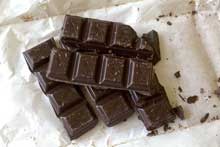Cooking an egg in it’s shell is one of the simplest cooking tasks, and yet so many get it so wrong. First of all, you shouldn’t boil an egg. When cooked at a high temperature, components of the yolk interact and a green ring forms. It’s edible, but ugly. Eggs should be hard-cooked, not hard-boiled. To do this, put eggs into a pot of water, making sure that there’s a good inch of water covering them. Bring to a full simmer, but not a rolling boil. Turn off the heat, and cover. Let sit for 14 minutes for small eggs and 16 for large ones. Chill the eggs in ice water and then drain and peel. The eggs will be firm, but not rubbery, and will have a beautiful yolk.
What you do not have to do is prick the end of the egg before cooking! I’ve seen this advice time and again, with the caveat that your egg will crack if you don’t. This is one of those myths that comes from a germ of truth. Years ago, before factory farms and cold storage, eggs were seasonal. Come winter and eggs were dear. A farmer would store eggs and sell in them in February, when the price was high. They used something called water-glass to preserve the eggs. Water-glass is a chemical, sodium silicate. When mixed with water, it forms a protective gel, which sealed off the pores of the egg shell. So, if you boiled an egg that had been sealed in such a way, the air in the egg would explode the shell – unless you pricked the end with a needle.
If your eggs do crack when cooking, it is likely that the shells were thin. Older chickens lay thin-shelled eggs. Even fed oyster shell for calcium, eggs from older hens are fragile. That’s yet another reason why commercial farms don’t keep chickens past the second molt. Egg breakage is too costly. I’ve learned to put the thin-shelled eggs gently in the egg basket and to not hard-cook them.
There are also plenty of myths about how to cook eggs so that they peel easily. Egg peeling ease is almost 100% a product of how old the egg is. The older it is, the easier to peel. Eggs less than 10 days old are always a pain to peel – the white sticks to the shell. This is because the membrane between the shell and white isn’t firm. So, if you want to hard-cook your freshly laid eggs, put them in a carton, label it with the date and store in the fridge for a week.
I have a recipe to share with you that uses hard-cooked eggs, but the eggs in my fridge are too fresh. So, I’m going to buy eggs from a small local farm and will post the results later this week.

Great info! This explains why mine yolks are sometimes ringed in green.
Is there any truth to adding vinegar to your water to prevent the eggs from cracking?
Nope. The vinegar does help to congeal white if it does crack – one reason why people poach eggs in water with a touch of vinegar. But, I find that if you poach very fresh eggs they don’t form strings at all.
so after you slip the eggs in, do you turn the water off(i’m assuming so)?
I’ve rewritten it to make it clearer. Sorry I was vague at first!
WOW, this info was so needed. The internet has a bazillion ways to cook eggs properly. Thanks for sharing !
I wish I could say that I came up with this technique on my own, but I didn’t. (I also wish I could credit whoever DID come up with the idea.) Anyway, if your eggs are too fresh, steam them for 20 minutes instead of hard cooking them in water. The shells will peel without any trouble.
Terry- I was so skeptical of your comment, so I just steamed two eggs and it worked perfectly! I’m amazed. If you can remember where you heard this, let me know. Anyone else ever hear of this? I’m going to have another post tomorrow with more on the egg steaming!
Adding something to water to help peel eggs is not a myth. I have been selling eggs for many years now and yes it is true that the membrane between the shell and egg has not matured thus making it hard to peel, so the older the egg the easier it is to peel. BUT…if you have fresh eggs(which i prefer) just put 1 tablespoon of baking soda in the water per doz of eggs hard cooked. Your eggs will peel with ease. Great instructons above for hard cooking eggs!
Hi Amy- I said that pricking the egg was a myth, not adding something:) But, I have done both vinegar and baking soda in boiling water and find that neither is entirely effective, and that they also affect the flavor and texture. A ten day old egg (properly stored in the fridge) tastes just as good as a day old egg, so I think I’ll stick with my method.
I’m curious where you found the info about the old storage method. I love all the historical tidbits you include in your posts!
From several old books, but specifically, “Poultry Breeding and Management” by James Dryden, 1918 (page 363-364 re: water-glass.)